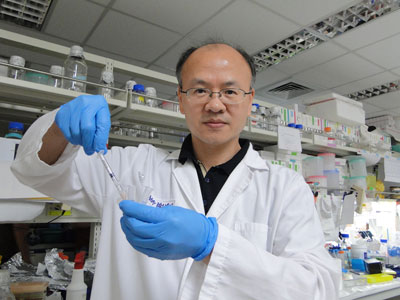| Aug 10, 2012 |
Nanomaterials help heart to heal
|
|
(Nanowerk News) A National Cheng Kung University (NCKU) research team has made a breakthrough in the regeneration of new blood vessels in cardiovascular therapy by using nanofibers and vascular endothelial growth factor (VEGF).
|
|
The new technology helps endogenous stem cells achieve cardiac and vascular regeneration, and is seen as a promising cure for heart diseases.
|
|
The study, led by Patrick C. H. Hsieh, associate professor and cardiac surgeon at NCKU, sheds light on cardiovascular therapy by providing a new strategy for cardiovascular repair.
|
 |
| Dr. Hsieh in his lab.
|
|
NCKU President Hwung-Hweng Hwung said lauded the team’s contribution, saying Hsieh is “a good professor dedicated to scientific research that is beneficial to society.”
|
|
The university will help the team carry out technology transfer in the hope that the novel treatment will be available for people with heart diseases, said Hwung.
|
|
The study combines tissue engineering, nanotechnology and controlled protein delivery to induce endogenous stem cells to improve cardiac function.
|
|
The therapy with VEGF, a key factor for vascular genesis, is one of the alternative methods used to treat cardiovascular diseases. However, the method hasn't worked well, according to Dr. Hsieh.
|
|
"The combination of nanomaterial with VEGF works well for the nanofibers to create a favorable microenvironment in the heart for recruiting stem cells," said Dr. Hsieh.
|
|
The experiments, done in rats and pigs, led to the growth of fresh blood vessels and improved heart function without harmful side effects, according to Dr. Hsieh.
|
|
The researchers said they treated the rats and pigs immediately after a heart attack. When it comes to people, said Dr. Hsieh, it might be similarly effective to give the therapy in the first week after a heart attack, when stem-cell activity is still high.
|
|
Cardiovascular disease is the first cause of death in advanced countries around the world and there are about 2 million patients with heart disease every year in Taiwan, with 400,000 deaths, mostly due to coronary artery disease leading to heart failure.
|
|
Following the publication of the team’s study by Science Translational Medicine ("Instructive Nanofiber Scaffolds with VEGF Create a Microenvironment for Arteriogenesis and Cardiac Repair") on Wednesday, both Science and Nature reported the NCUK study for its importance. The Wall Street Journal, Businessweek, SWR German Public Radio and Correio Braziliense have also arranged for exclusive interviews with team members.
|

